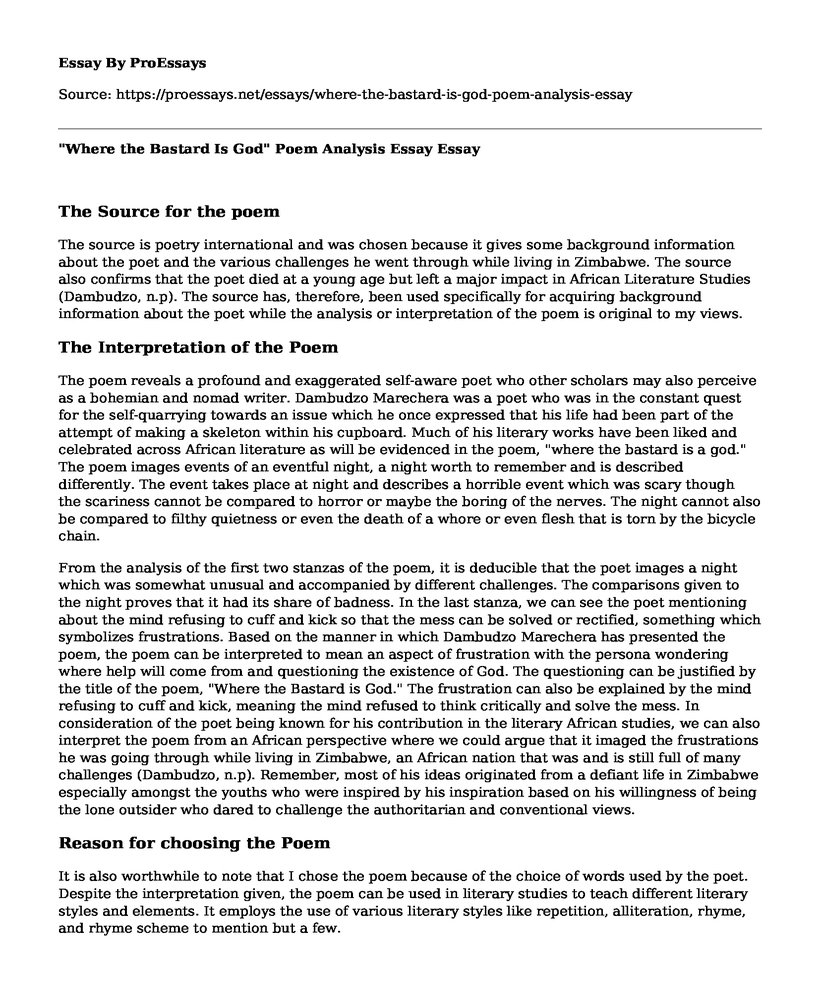The Source for the poem
The source is poetry international and was chosen because it gives some background information about the poet and the various challenges he went through while living in Zimbabwe. The source also confirms that the poet died at a young age but left a major impact in African Literature Studies (Dambudzo, n.p). The source has, therefore, been used specifically for acquiring background information about the poet while the analysis or interpretation of the poem is original to my views.
The Interpretation of the Poem
The poem reveals a profound and exaggerated self-aware poet who other scholars may also perceive as a bohemian and nomad writer. Dambudzo Marechera was a poet who was in the constant quest for the self-quarrying towards an issue which he once expressed that his life had been part of the attempt of making a skeleton within his cupboard. Much of his literary works have been liked and celebrated across African literature as will be evidenced in the poem, "where the bastard is a god." The poem images events of an eventful night, a night worth to remember and is described differently. The event takes place at night and describes a horrible event which was scary though the scariness cannot be compared to horror or maybe the boring of the nerves. The night cannot also be compared to filthy quietness or even the death of a whore or even flesh that is torn by the bicycle chain.
From the analysis of the first two stanzas of the poem, it is deducible that the poet images a night which was somewhat unusual and accompanied by different challenges. The comparisons given to the night proves that it had its share of badness. In the last stanza, we can see the poet mentioning about the mind refusing to cuff and kick so that the mess can be solved or rectified, something which symbolizes frustrations. Based on the manner in which Dambudzo Marechera has presented the poem, the poem can be interpreted to mean an aspect of frustration with the persona wondering where help will come from and questioning the existence of God. The questioning can be justified by the title of the poem, "Where the Bastard is God." The frustration can also be explained by the mind refusing to cuff and kick, meaning the mind refused to think critically and solve the mess. In consideration of the poet being known for his contribution in the literary African studies, we can also interpret the poem from an African perspective where we could argue that it imaged the frustrations he was going through while living in Zimbabwe, an African nation that was and is still full of many challenges (Dambudzo, n.p). Remember, most of his ideas originated from a defiant life in Zimbabwe especially amongst the youths who were inspired by his inspiration based on his willingness of being the lone outsider who dared to challenge the authoritarian and conventional views.
Reason for choosing the Poem
It is also worthwhile to note that I chose the poem because of the choice of words used by the poet. Despite the interpretation given, the poem can be used in literary studies to teach different literary styles and elements. It employs the use of various literary styles like repetition, alliteration, rhyme, and rhyme scheme to mention but a few.
Works Cited
Dambudzo, Marechera. Poetry International Web. Zimbabwe. 2002. Retrieved from https://www.poetryinternationalweb.net/pi/site/poet/item/5755/25/Dambudzo-Marechera
Cite this page
"Where the Bastard Is God" Poem Analysis Essay. (2022, Sep 22). Retrieved from https://proessays.net/essays/where-the-bastard-is-god-poem-analysis-essay
If you are the original author of this essay and no longer wish to have it published on the ProEssays website, please click below to request its removal:
- Gender and Sexuality in The Catcher in the Rye and The House on Mango Street
- Critical Analysis of Bag of Bones Using Literature Criticism
- Townspeople Support in a Rose for Emily Essay
- Book Analysis Essay on Strangers of the Land by Arlie Hochschild
- Essay Example on Dreaming in Cuban by Cristina Garcia
- Essay on Man vs. Man: The Fight for Survival in Lord of the Flies and The Most Dangerous Game
- El Callejon del Beso: A Romantic Folk Tale of Mexico - Book Review Sample







